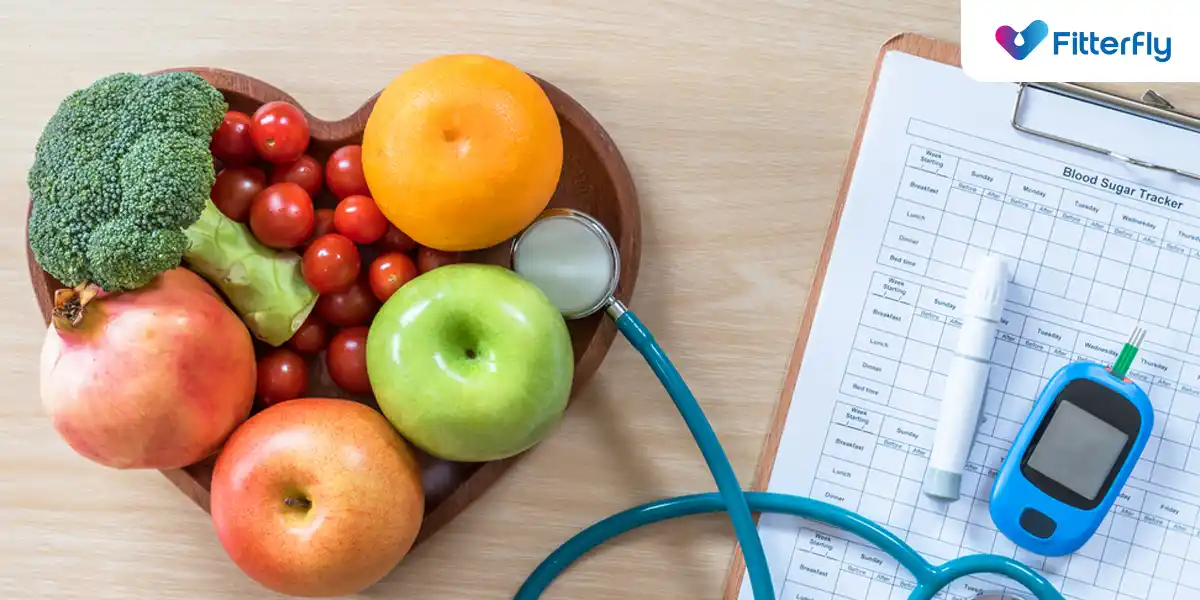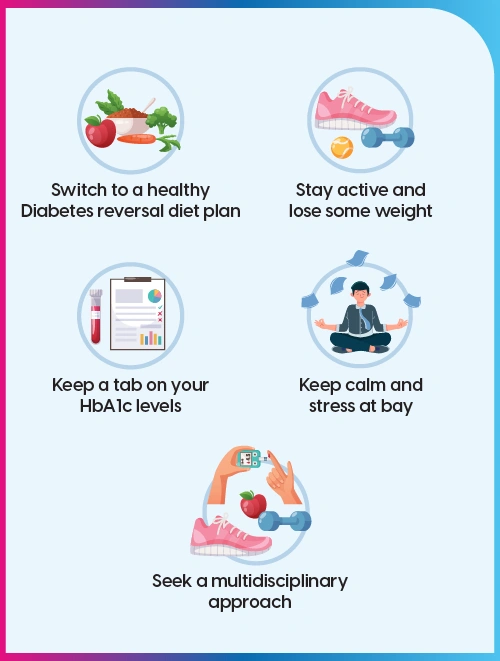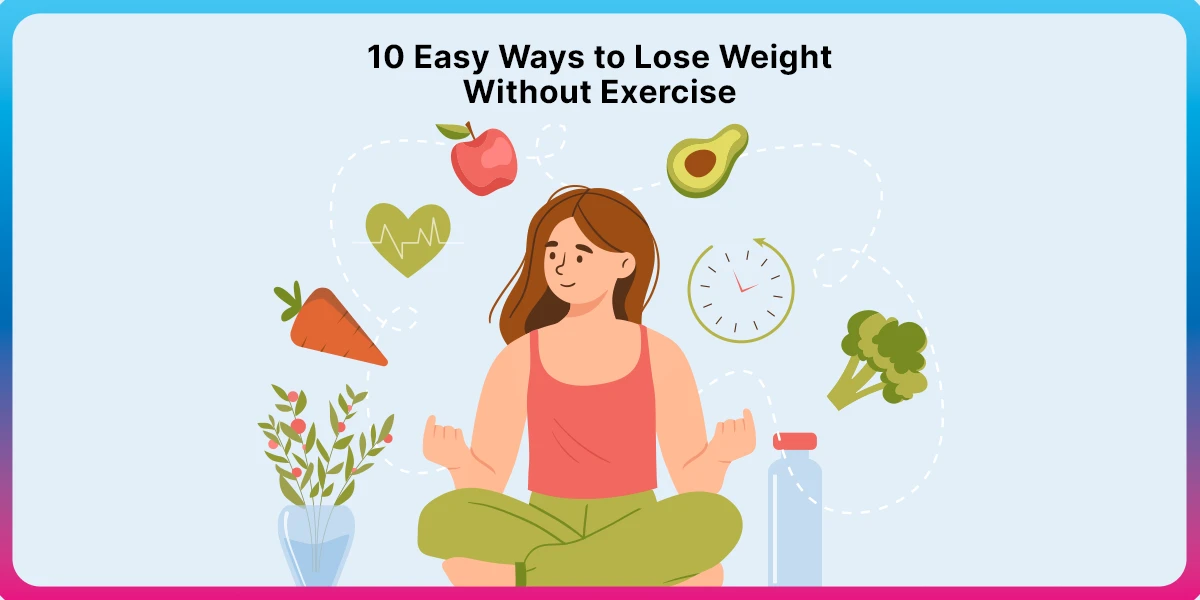Can Type 2 Diabetes be Cured Permanently?

If you are living with diabetes or have a loved one who has been waging this ‘sugar-war’ for long, you might be desperately waiting for a cure for this condition.
Despite the advances in medical sciences and innovative treatment methods available, there is no cure for type 2 diabetes, but with proper lifestyle management it can be reversed*.
Is type 2 diabetes reversible?
The good news is yes, type 2 diabetes can be reversed and one can go into remission. Yes, you read it right – diabetes reversal is possible.
Simple steps like modifying one’s diet habits and bringing in some positive lifestyle changes can make a big difference. These things are attainable with little help and sheer dedication.
Understanding the Term Remission vs. Cure
“Remission” and “cure” are two terms often used in the context of medical conditions, including chronic diseases like cancer, diabetes, and autoimmune disorders. While they both signify positive outcomes in managing or treating a condition, they have distinct meanings:
Remission
- Remission refers to a state in which the signs and symptoms of a medical condition have improved or disappeared to the extent that they are no longer clinically detectable.
- It is a term commonly used in the context of chronic diseases, such as diabetes, cancer etc.
- Achieving remission doesn’t necessarily mean the disease is entirely gone or cured. Instead, it implies that the condition is under control or has temporarily improved.
- Remission can be partial or complete. Partial remission means that some symptoms or markers of the disease persist, at a reduced level of severity, while complete remission suggests that all symptoms and markers have disappeared.
Cure
- Cure, on the other hand, implies that a medical condition has been completely eliminated from the body.
- It signifies that there is no longer any presence of the disease, and the individual is considered healthy and disease-free.
- For some chronic conditions like diabetes or certain cancers, achieving a cure may be extremely challenging or not possible with current medical knowledge and treatments.
What is Diabetes Reversal?
Diabetes reversal means keeping your blood sugars and HbA1c levels (blood sugar readings for the past three months) under control without the help of medications and injections.
This is possible to achieve with proper diet and exercise. Ideally, if you can keep your HbA1c below 6.4 % for over a year without medication, in that case, doctors believe that you are in remission and have reversed diabetes successfully.
How to Reverse type 2 Diabetes?
To reverse diabetes, the goal should be to lead a healthy everyday life without being dependent on oral medication or insulin and limit the chances of complications due to elevated sugar levels.
However, remember that reversing diabetes is not a one-time process. You need to adhere to all the healthy habits you learnt while trying to reverse diabetes, lifelong.
Since diabetes has no cure, lifelong management of the condition is necessary, even when in remission. Deviating from healthy lifestyle habits can increase the chances of a relapse exponentially.
For instance, if your HbA1C levels were higher than 7% or more and you got it under 6.4%, kept it under control for more than a year, is considered to be in remission.
However, even in remission you have to be monitored by your doctor regularly. If you go off track within a year or so, your HbA1c levels can be back in the diabetes range. This is why diabetes reversal is not permanent, but a lifelong process to keep your blood sugars in check.


So, here are a few things that you can do:
1. Switch to a healthy diabetes reversal diet plan
-
Make it a habit to eat healthy balanced meals:
Make sure that there is a mix of protein, fat, and fibre on your plate, along with the right kind of carbs.
-
Control your carbohydrate load:
If you have been eating a high carb diet for a long time, it makes sense to cut down on your carb intake and balance your plate with other food components to get more nutrition out of your meals. Choose complex carbohydrates over simple ones.
-
Choose whole grains food over processed food:
Choose brown rice, whole grains, brown bread, millets, quinoa, oats over white rice, white flour, white bread and other processed foods.
Remember, diet management to control diabetes is not all about having a balance of carbohydrates, proteins and fats. You need to focus on incorporating all the macro and micronutrients too.
A deficiency of zinc, magnesium, vitamin C, iron, calcium, can make your blood sugar readings go haywire and affect your major organs too.
-
Your carbohydrate load should not exceed 45 to 50 gms in your main meals.
Here is how an ideal meal plate should look –
1. Half plate with vegetables cooked, steamed or tossed
2. A quarter of the plate with proteins – meat, eggs, legumes, pulses, tofu, cottage cheese or paneer
3. Other quarter with complex carbohydrates like – brown rice, chapati, millets, daliya, etc
-
Try to plan for 3 main meals a day and 3 snacks.
Space out your meal throughout the day so there are sufficient gaps in between meals – not too much or not too little. Ideally, you should eat something every three to four hours for optimal blood sugar management.
Of course, it takes some planning to eat the right carbs and in the right amount to keep your postprandial (PP) blood sugar in check. Here is where expert help and advice can be of help.
At Fitterfly Diabetes Care Program – our expert panel of nutritionists help you to be on track with your diet choices and make lifestyle changes that positively impact your well-being.
It focuses on everything in your diet (not just carbs and fats), including micronutrients and corrects any kind of deficiency that might be detrimental to your health.
It is imperative to include essential nutrients and micronutrients in your diet as a deficiency of the same can hinder insulin production, utilisation of glucose, sleep cycle, and impact heart health.
2. Stay active and lose some weight
Weight loss has a positive impact on diabetes management and can increase your chances of diabetes reversal manifolds. Regular exercise and fat loss can improve insulin sensitivity and help lower your blood sugar.
In fact, if you are on medication, overtime exercise can help you stop using medicine and improve your chances of reversal.
If you have lived a sedentary life and feel lost to exercise, we understand your situation. Most people who are diagnosed with type 2 diabetes find it difficult to start exercising.
The best thing to do is to get moving – ditch the car for a grocery store trip or to drop your kids at the bus stop. Take short walks, but this will not help you to reverse diabetes.
You have to put in some extra effort – including strength training with regular walking and any other mode of exercise that you choose.
Our physiotherapists at Fitterfly Diabetes Care Program pay attention to every detail from medical history, fitness assessmen to, injury history; before helping you draft an exercise plan to lose weight and get blood sugars in control.
3. Keep a tab on your HbA1c or A1c levels
The A1c test gives you your average blood sugar readings for over a few months, precisely three months. Sugar binds to the haemoglobin present in your red blood cells and the HbA1c test measures this sugar to give a clear picture of how well your diabetes is managed.
Ideally, experts believe that having your HbA1c levels less than 6.4 % indicate your diabetes is well under control and you are on your road to reversal.
If you are able to keep the levels the same without medications for over a year, doctors might consider that you are in remission or your condition is reversed.
Here are some natural ways in which you can lower your HbA1c levels.
To know your chances of Diabetes reversal, take the Diabetes Reversal TestDiabetes Reversal
Calculator
4. Keep calm and stress at bay
Chronic stress and anxiety is known to raise blood pressure and make a dent in your blood sugar management efforts. Also, emotional distress like – guilt, greif, disappointments, frustrations – make it difficult for one to be on track with medications and stick to healthy habits.
Hormones secreted due to stress and emotional distress trigger weight gain, leads to insulin resistance and keeps blood sugar raised in the bloodstream. To reverse diabetes, it is also important to take care of your mental well-being.
We all know it is difficult to get up and go for a jog for 20 minutes when you are wrapped in a blanket of overwhelming emotions.
5. Seek a multidisciplinary approach:
Remember, bringing your blood sugar under control is not always about diet and weight loss; there are a lot of factors that can come to play – your sleep cycle, stress levels, your anxiety, time management and much more.
Lifestyle changes call for more effort than just tweaking the diet or doing a 30 minutes jog. This is why, at Fitterfly Diabetes Care Program, a team of specialists, including – a nutritionist, a certified physiotherapist and a clinical psychologist, work together with your Doctor to help you achieve your health goals with tailor-made plans made according to your needs.
The coaches work in tandem to ensure the best care and outcomes along with your doctor’s medical treatment. Your mental and psychological well-being is of equal importance in diabetes reversal, as is your physical health.
Is Type 2 Diabetes Reversal Possible for Everyone?
1. Sometimes, despite taking all the measures like diet, exercise, weight loss, and stress management, some people are unable to reverse their diabetes or get into remission.
2. Researchers still don’t fully know what makes it workable for some and not for others. However, there are a few parameters that can help in deciding if a diabetes reversal is possible for someone:
3. Diabetes reversal or remission is most likely to happen if your condition is in the early stages.
4. However, as the condition progresses, the body may slowly lose its ability to make insulin over time, and reversal might not be viable.
To know if you can reverse your diabetes, try our Fitterfly Diabetes Reversal Calculator, which will assess your chance of reversing diabetes. The higher the score is, the better your chances of reversal.
How We At Fitterfly Can Help You?
If you can manage your HbA1c levels without medication for more than a year, you are believed to be in complete remission; if you can do so for more than 5 years, you are in prolonged remission.
However, even during your remission period, you will still need to be tested for high blood sugar, high blood pressure, high cholesterol, kidney and eye problems. This is done as a safety measure to ensure that your symptoms don’t flare up and a relapse is not on the cards.
Sign up for Fitterfly’s Diabetes Care Program, which offers personalised expert guidance to help you control your blood sugar levels in the healthiest way possible.
If you wish to manage your diabetes better and bring it to remission, speak to one of our counselors by just giving us a missed call at 08069450746, and we will definitely get back to you.
*Diabetes Remission is the clinical term for Diabetes Reversal.
REVERSED Diabetes in 3 months


5.7%
Happy members
EMI
Guarantee
4.8/5
Diabetes Prime Program
Frequently Asked Questions
Can medications or insulin therapy cure Type 2 diabetes?
Medications and insulin therapy can help manage Type 2 diabetes, but there is currently no cure for the disease. Lifestyle modification, diet control and being active is the best alternative in order to maintain your blood sugar under control.
Is early diagnosis crucial for the potential cure of Type 2 diabetes?
Yes, early diagnosis and lifestyle modifications is not only important for the better management of Type 2 diabetes but also, to prevent complications and achieve deiabetes remission.
What is the difference between Type 2 diabetes remission and a cure?
Type 2 diabetes remission is when blood sugar levels are normal without the use of diabetes medication or insulin therapy. Whereas, a cure for diabetes, on the other hand, implies that a medical condition has been completely eliminated from the body which is practically not possible.
Can Type 2 diabetes return after achieving remission?
Yes, Type 2 diabetes can return after achieving remission, if you failed to follow the lifestyle modification and advices given to you by your healthcare provider.
Can weight loss surgery cure diabetes?
Weight loss surgery (or bariatric surgery) can lead to significant improvements in blood sugar control, sometimes even leading to remission of Type 2 diabetes, especially in people who have recently been diagnosed and those not dependent on insulin. However, it's not considered a universal cure as diabetes management varies from person to person.
Can a pancreas transplant cure Type 2 diabetes?
A pancreas transplant can provide excellent blood glucose control in type 2 diabetes. However, due to the complexity and risks associated with transplant surgery, it's typically considered only in severe cases.
Is intermittent fasting a potential cure for diabetes?
Intermittent fasting can improve blood sugar control and insulin sensitivity, which may be beneficial for managing type 2 diabetes. However, it can not be considered a way to cure diabetes alone. It's important to approach fasting carefully, especially for those on diabetes medication, to avoid hypoglycemia.
Are there specific diets, like the keto diet, that can cure diabetes?
Diets like the ketogenic diet can help manage diabetes by reducing carbohydrate intake and, consequently, blood sugar levels. While these diets can significantly aid in diabetes management and may lead to remission in some cases, they are not universally recognized as cures for diabetes.
Can regular exercise alone cure diabetes?
Regular exercise is a key component of diabetes management and can help improve blood sugar control and insulin sensitivity. While exercise alone might not cure diabetes, it can lead to significant health improvements and, in some cases, remission, especially when combined with dietary changes and weight loss.
Can diabetes be cured by walking?
Walking, as a form of regular physical activity, can help improve diabetes management by lowering blood sugar levels and improving insulin sensitivity. While not a cure, consistent walking can be a powerful tool in the overall management strategy for diabetes.
Could stem cells offer a potential cure for diabetes?
Stem cell research shows promise for regenerating insulin-producing cells, which could potentially cure diabetes. However, this area of research is still in its early stages, and more studies are needed to determine its safety, efficacy, and long-term outcomes.
Does islet cell transplantation provide a cure for diabetes?
Islet cell transplantation can help achieve insulin independence in some people with Type 1 diabetes. While promising, it's not widely available and comes with risks, such as the need for lifelong immunosuppressive drugs. It's considered more of a treatment than a cure.
Is there ongoing research into finding a cure for diabetes?
Yes, there is extensive ongoing research into finding a cure for diabetes. This includes studies on islet cell transplantation, stem cell therapies, artificial pancreas systems, and novel medications. The goal is to find more effective, safer, and widely applicable solutions for diabetes management and potential cures.
Is there a genetic component to diabetes that affects its curability?
Yes, genetics play a significant role in the development and management of diabetes, particularly Type 2 diabetes. While lifestyle factors are crucial in managing the condition, genetic predispositions can affect its onset, progression, and response to treatment, impacting the potential for remission or cure.





















